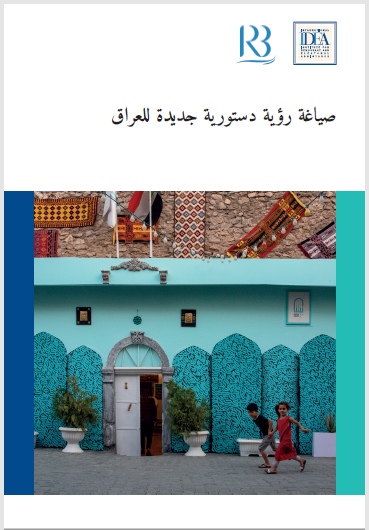صياغة رؤ ية دستور ية جديدة للعراق
في عام 2022، أطلق مركز رواق بغداد للسياسات العامة والمؤسسة الدولية للديمقراطية والانتخابات مشروع لإثبات أن العراقيين من خلفيات سياسية واجتماعية وجغرافية وعرقية وطائفية مختلفة يستطيعون التوصل إلى اتفاق بشأن تحسين الإطار الدستوري للدولة إذا توفرت الظروف المناسبة.
سعى شركاء المشروع إلى تقديم مثال إيجابي عن كيفية تنظيم نقاشات حول الإصلاح الدستوري، وإثبات إمكانية تحقيق توافق بهذا الخصوص. وسعى المشروع إلى تحقيق ذلك من خلال إجراء نقاشات غير رسمية وغير ملزمة حول قضايا الإصلاح الدستوري، شارك فيها عدد كبير من الأطراف. وكما يرد أدناه بمزيد من التفصيل، فقد جرت، على مدى أشهر، مناقشات وحوارات معمقة حول عناصر الدستور الأكثر أهمية وتم تلخيص نتائجها أدناه.
تم تشكيل «لجنة الحوار» لتتولى صياغة رؤية مشتركة للإصلاح الدستوري. ومن المهم أن تشكيل اللجنة لم يتم وفق صيغة عرقية طائفية متشددة، بل أعطى شركاء المشروع الأولوية لضمان تمثيل وجهات نظر سياسية مختلفة وخبرات مهنية متنوعة. وكانت النتيجة أن اللجنة ضمت خبراء في القانون الدستوري وأعضاء من الجماعات السياسية ونشطاء من المجتمع المدني.
فقد كان أحد الجوانب الحاسمة لهذا المشروع هو إجراء حوار بشأن الدستور مع مختلف المجتمعات العراقية. وشارك في الجلسات فئات مختلفة من المتحاورين، من خبراء قانونيين واقتصاديين، وأفراد من خلفيات مهنية متنوعة، وممثلين عن جماعات سياسية، وناشطين مدنيين، وأعضاء وممثلين عن مؤسسات دينية مختلفة، وغيرهم. إضافة لذلك، ولزيادة تنوع الآراء، تم تنظيم جلسات الحوار في أجزاء مختلفة من البلاد. وبالتحديد، نظم المشروع أربع جلسات في بغداد (ضمت كل منها فئات مختلفة من المشاركين)، وجلسات أخرى في البصرة وأربيل والموصل والنجف.
هذه الوثيقة هي التقرير النهائي للجنة الحوار، وتمثل رؤية اللجنة للإصلاح الدستوري. لم تتضمن مسؤوليات لجنة الحوار اعتماد أي من وجهات النظر المختلفة التي نوقشت بوصفها صائبة. كانت مسؤولية اللجنة، بعد التواصل مباشرة مع الأطراف المعنية في مختلف أنحاء العراق، هي تقديم رؤيتها الخاصة لتحسين الإطار الدستوري.
***
Developing a new vision for constitutional reform in Iraq
In 2022, Rewaq Baghdad and International IDEA launched a project in large part to demonstrate that it is possible for Iraqis from different political, social, geographic and ethnosectarian backgrounds to reach agreement on an improved constitutional framework under appropriate circumstances. The project partners sought to provide a positive example of how a debate on constitutional reform could be organised, and to demonstrate that an agreement on constitutional reform can be achieved. The project sought to achieve this by launching an informal and non-binding debate on constitutional reform that engaged a broad range of actors.
A “Dialogue Committee” was formed for the purpose of formulating a joint vision for constitutional reform. The Dialogue Committee’s composition was determined pursuant to a consultation process with political groups, civil society leaders, experts and others to determine a makeup that was sufficient representative of all of these groups.
The Dialogue Committee entered into dialogue with Iraq’s different communities. Different categories of participants participated in the sessions, including legal and economic experts, individuals of different professional backgrounds, representatives of political groups, civil society activists, members and representatives of different religious institutions, and others. In addition, to increase the diversity of views, dialogue sessions were organized in different parts of the country. In particular, four sessions were organized in Baghdad (each of which included different categories of participants), and sessions were also organized in Basra, Erbil, Mosul, and Najaf.
This current document is the Dialogue Committee’s final report, and represents the Dialogue Committee’s vision for constitutional reform. The Dialogue Committee’s responsibility was not to decide which of the different perspectives that they encountered was correct, or even to find a good compromise between them. The Committee’s responsibility was, after having engaged directly with stakeholders throughout the country, to identify its own vision for an improved constitutional framework.
